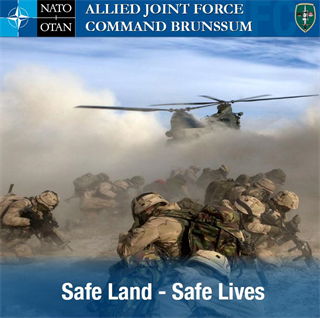
Supporting the NATO Mission - Allied Joint Force Command (JFC) Brunssum is one of three headquarters in NATO at the operational-level, together with JFC Naples (Italy) and JFC Norfolk (United States). JFC Brunssum plans, executes and supports military operations within its assigned missions and tasks to deter and defend against all threats across all domains, in order to preserve freedom and security, national sovereignty and peace of NATO Members and Partners.
Force Disposition - NATO's military presence in the eastern part of the Alliance is a key part of the NATO's overall deterrence and defence posture. This forward presence is defensive, proportionate, transparent and in line with the Alliance's international commitments and obligations. It also represents a significant commitment by Allies and is a tangible reminder that an attack on one NATO member country is an attack on all.
Multinational battalion-size battle groups are provided by framework nations and other contributing Allies on a voluntary, fully sustainable and rotational basis.
These battle groups operate in concert with national home defence forces and are present at all times in the host countries. They are not identical; their make-up is tailored to geographic and host nation requirements. Overall, military effectiveness guides each battle group's composition. Today, troops from over 20 Allies serve, train and exercise together, representing a strong expression of Alliance unity and solidarity.
The United Kingdom, Canada, Germany and the United States are the framework nations for the robust NATO presence in Estonia, Latvia, Lithuania and Poland respectively. In response to Russia's invasion of Ukraine, at the extraordinary NATO Summit in Brussels on Mar. 24, 2022, Allied Heads of State and Government agreed to establish four more multinational battle groups in Slovakia, Hungary, Bulgaria and Romania.
In these eight countries, small headquarters, called NATO Force Integration Units (NFIUs), are also established on a permanent basis in order to facilitate a rapid deployment of additional forces in the region if decided. NFIUs are working in conjunction with host nations to identify logistical networks, transportation nodes and supporting infrastructure in order to ensure that NATO high-readiness forces can deploy to an assigned region as quickly as possible. They support collective defence planning and assist in coordinating training and exercises.
Six of these eight countries are in JFC Brunssum's area: Estonia, Hungary, Latvia, Lithuania, Poland, and Slovakia.
Regional Focus - Headquarters JFC Brunssum (HQ JFCBS) is actively engaged with many headquarters. This initiative embraces liaison with NATO member and non-member nations, International & Non-Governmental Organisations, and organisations who are security-focused stakeholders. By energising this 'Regional Focus' HQ JFCBS seeks to foster an open and million Euros annually in the Limburg region. In addition, the JFC Brunssum headquarters has an annual local "goods and services" spend of circa 21 million Euros and indirectly creates over 1100 jobs. JFC Brunssum is considered a major regional economic stakeholder.
- JFC Brunssum, in collaboration with Industriebank LIOF and the Chamber of Commerce of Southern Limburg, commissioned an economic impact study of the NATO base in Brunssum. The study concluded that personnel working on the Brunssum site spend more than 100 million Euros annually in the Limburg region. In addition, the JFC Brunssum headquarters has an annual local "goods and services" spend of circa 21 million Euros and indirectly creates over 1100 jobs. JFC Brunssum is considered a major regional economic stakeholder.